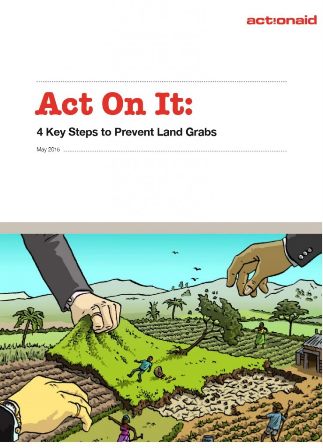Act On It! Four key steps to stop land grabs
Over the past 15 years, tens of millions of hectares of land have been acquired by large investors in developing countries. The Land Matrix documented 1,037 transnational land deals covering 37,842,371 hectares during this period, while many more deals remain undocumented.1 This global land rush is causing widespread forced evictions and denial of access to key land and natural resources for millions of women, small- scale food producers, pastoralists, gatherers, forest dwellers, fisherfolk, and tribal and indigenous peoples.
Access to and control over land and natural resources is, however, crucial to people’s livelihoods and to ensuring their rights to food, water, work, housing and a healthy environment. Governments and donor institutions have the opportunity and responsibility to ensure that their policies and actions contribute to the recognition and respect of these rights. To prevent further land grabbing and help realise the right to food for all, ActionAid urges governments and donors to adopt a human rights-based approach to development and take the following four steps:
STEP 1: Fully implement the Tenure Guidelines on land, fisheries and forests through participatory, inclusive mechanisms that prioritise the rights and needs of legitimate tenure users, especially women.
STEP 2: Ensure the free, prior and informed consent for all communities affected by land transfers, including the fair and equitable participation of all groups within local communities, especially excluded and marginalised groups such as women, children, minorities, the elderly and disabled.
STEP 3: Review public policies and projects that incentivise land grabbing, and instead support policies that prioritise the needs of small-scale food producers – particularly women – and sustainable land use.
STEP 4: Regulate businesses involved in land deals so that they are fully accountable for respecting human rights, tenure rights and environmental, social and labour standards. This includes ensuring that investors carry out comprehensive human rights due diligence, are transparent and are fully accountable throughout all their operations at home and abroad.
This report sets out how these four steps can be implemented by governments through a detailed checklist of policy reforms and actions, including concrete examples from countries where these were implemented.
